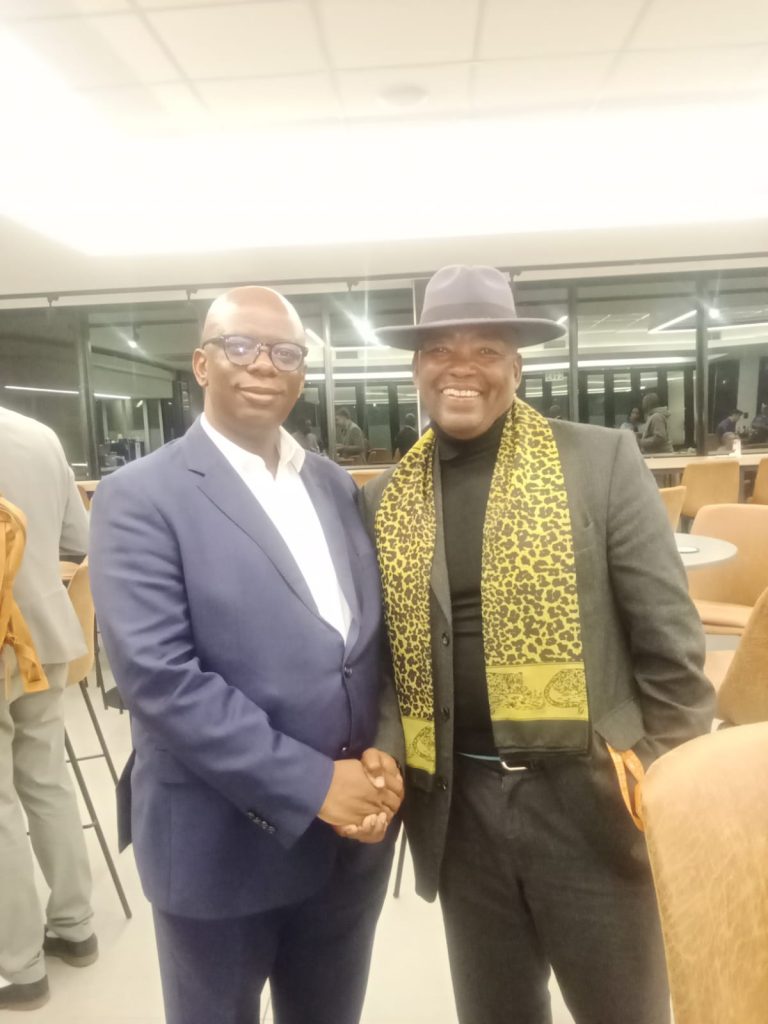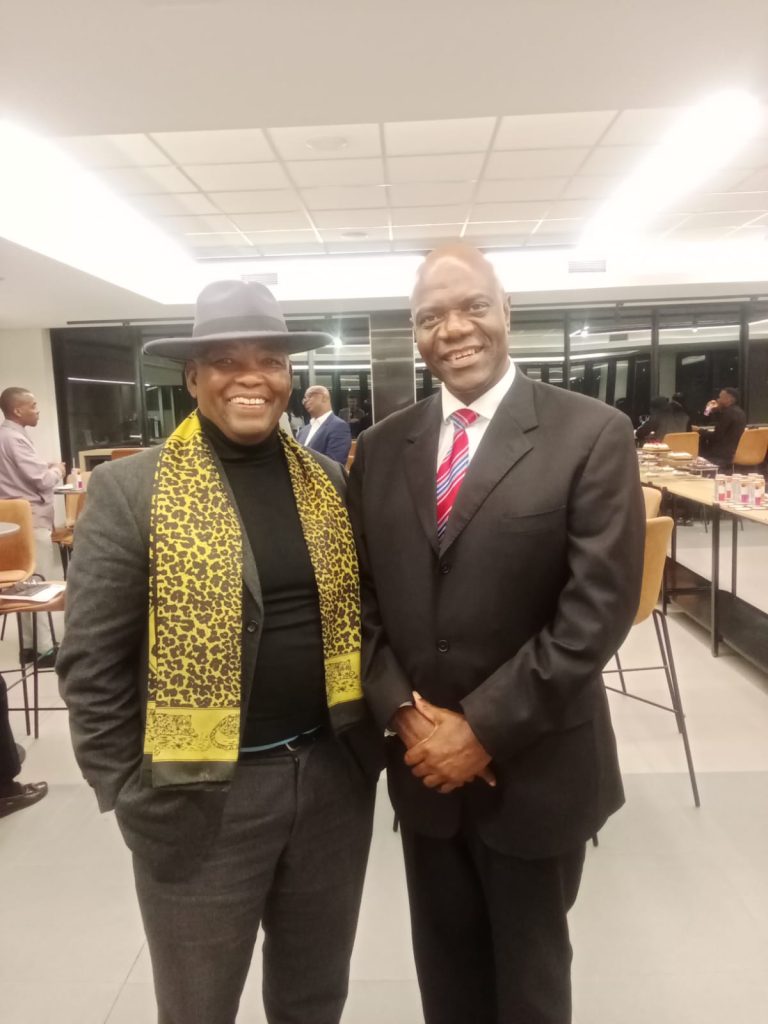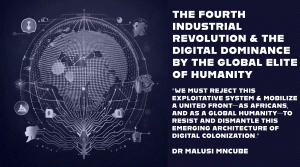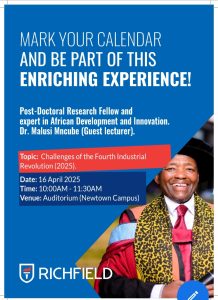On the 11 April 2025 at the University of Johannesburg Professor Arthur Mutambara presented a conference paper “The Implications of Artificial Intelligence on Geopolitics”. Dr Malusi Mncube went on to interview the panelists on the topic thus; Professor Arthur Mutambara; Professor Monyae and Professor Koffi.
Here in under is a synoptic paper authored by Dr Malusi Mncube highlighting the essence of the topic as it was discussed.
Artificial Intelligence and Geopolitics: Implications for U.S.-China Rivalry, BRICS-G7 Dynamics, and Africa’s Digital Sovereignty
Author: Dr. Malusi Mncube
Postdoctoral Research Fellow, Department of Politics and International Relations, University of Johannesburg
Abstract:
Artificial Intelligence (AI) is reshaping global power structures, accelerating geopolitical rivalry between the United States and China, and amplifying tensions between the Global North (G7) and the Global South (BRICS). For Africa, the implications of this AI-driven geopolitical realignment are profound, particularly in light of its digital dependency on Western Big Tech monopolies. This paper explores the civilian and military applications of AI in contemporary geopolitics and interrogates the neocolonial dynamics of digital exploitation in Africa. It concludes with strategic recommendations for Africa to assert digital sovereignty and reimagine its role in the evolving global order.
Keywords: Artificial Intelligence, Geopolitics, Africa, BRICS, G7, Digital Sovereignty, Neocolonialism, Fourth Industrial Revolution
1.Introduction
Artificial Intelligence has transitioned from being a technological curiosity to becoming a strategic domain of international politics. In the 21st century, control over data, algorithms, and computing infrastructure is tantamount to geopolitical power. As AI capabilities grow, so too does the struggle among global powers to dominate this frontier.
2. U.S.-China AI Rivalry: The New Technological Cold War
The United States and China are embroiled in a contest to dominate AI, with massive state and private sector investments in R&D. The U.S. relies on corporate giants such as Google, Microsoft, and OpenAI, while China pursues a state-led model through the Next Generation AI Development Plan. This competition spans:
- Economic spheres: AI integration into sectors like finance, healthcare, and logistics.
- Military applications: Autonomous weaponry, battlefield analytics, and cyber warfare.
- Standard-setting diplomacy: Competing to shape the rules and norms of global digital governance.
This AI arms race is not only about economic advantage but about who will define the rules of engagement in the post-industrial digital world.
3. BRICS vs. G7: The AI Divide in a Multipolar World
The BRICS bloc represents a growing counterweight to G7 technological hegemony. Yet, even among BRICS countries, there is uneven AI capability and reliance on foreign infrastructure. Key tensions include:
- Digital sovereignty vs. dependency: G7 countries retain control over core technologies and intellectual property.
- Data colonialism: BRICS and African nations often serve as raw data providers for Western algorithms.
- Military asymmetries: NATO advances in AI-integrated warfare are unmatched by BRICS.
Without cohesive AI strategies, BRICS nations risk marginalization despite their ambitions for multipolarity.
4. Civilian and Military Applications of AI
AI innovations offer dual-use potential across several domains:
- Civilian: Healthcare diagnostics, smart agriculture, personalized education, and fintech.
- Military: Lethal autonomous weapons, biometric surveillance, and cyber conflict.
Such developments raise profound ethical, security, and regulatory challenges, particularly in conflict-prone or institutionally weak regions.
5. Africa and AI: Neocolonialism in the Digital Age
Africa’s integration into the global AI economy is largely passive, shaped by external actors and capital. Key dynamics include:
- Dominance of GAFAM (Google, Amazon, Facebook, Apple, Microsoft): These corporations extract African data to train AI models, with minimal reinvestment or local benefit.
- Digital dependency: African states often outsource critical infrastructure to foreign entities, undermining sovereignty.
- Policy gaps: Few African nations have comprehensive AI strategies or data protection laws.
This digital neocolonialism threatens to replicate historical patterns of exploitation under a new technological guise.



6. The Way Forward: Towards Pan-African Digital Sovereignty
To reclaim agency in the AI era, Africa must pursue an assertive digital sovereignty agenda:
- Pan-African AI Governance: Expand the AU’s Digital Transformation Strategy to include binding norms on data ethics, transparency, and accountability.
- Investment in Indigenous AI Capacity: Fund local startups, research institutions, and education pipelines.
- Continental Data Infrastructure: Establish Africa-based cloud services and data centers.
- South-South Collaboration: Partner with BRICS nations for technology transfers and knowledge exchange.
- AfCFTA Digital Market: Harmonize digital trade policies to create a competitive continental ecosystem.
- Data Justice and Rights: Develop and enforce African data protection laws aligned with local values and priorities.
7. Conclusion
AI is a transformative force in global geopolitics, one that both reflects and amplifies existing inequalities. For Africa, the challenge is to avoid becoming a digital periphery and instead emerge as a sovereign player in the fourth industrial revolution. By asserting control over its data, investing in AI capacity, and fostering continental unity, Africa can help shape a more equitable and multipolar digital future.
Discover more from Dr Malusi Mncube
Subscribe to get the latest posts sent to your email.



